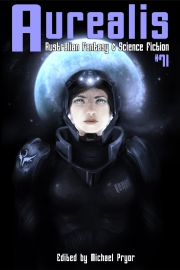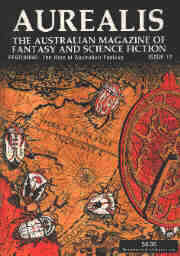Aurealis #71
$3.99
Aurealis #71 features ‘Ascension’, an unsettling tale of otherness from Michael Grey, and Emma Osborne’s ‘Clean Hands, Dirty Hands’ – Australian Gothic writ large. Shane M Brown offers sage advice in ‘The Six Critical Elements When Publishing Your First eBook’ and our reviews section is bigger and better than ever. Aurealis #71, good to the last drop.
- From the Cloud — Michael Pryor
- Ascension — Michael Grey
- Clean Hands, Dirty Hands — Emma Osborne
- The Six Critical Elements When Publishing Your First eBook — Shane M Brown
- Reviews
- Next Issue
- Credits
Aurealis has a proud history of publishing fiction in Australia. Since our first issue, we have introduced new authors to the reading public and given established authors a means to continue their relationship with their audience.
These are some of the things we’ve learned over nearly twenty-five years of selecting stories for publication.
- If you don’t read in the genre, you’re unlikely to create an original, refreshing genre story.
- One idea is rarely enough to sustain a story.
- Many stories would be far better off if they were a third shorter.
- If you use genre trappings, then your story will end up in the reject pile. ‘Trappings’ implies something added after the event, mere decoration. Respect the genre.
- Short stories are short. Don’t waste time—get into the story.
- If you can’t handle dialogue, your story will suffer badly.
- If nothing happens in your story, you don’t have a story. You might have a vignette, or a mood piece, but we don’t publish vignettes or mood pieces.
- Stories that only have one character can struggle. So much talking to her/himself…
- Don’t submit a first draft. Submit a story that you’ve polished until it glows.
- Clichés are clichés are clichés—and we’re not interested. Whether it’s a clichéd story idea or a clichéd character or a clichéd resolution, we’rereally not interested.
- Solid, well-crafted writing beats pretentiousness every time.
- We are well over monospaced fonts. Courier is hard to read.
- If you’re not spelling and punctuating properly, you’re not using the fundamental building blocks of writing. Very few stories show a finely structured, well-nuanced, carefully textured narrative with poor spelling and grammar.
- Genre cred isn’t enough. You must write well on top of that.
- Subtly integrating background detail about the different places and times your story is set in is a major and impressive skill, likely to get our attention.
- Character diversity is a good thing and tends to suggest a thoughtfulness that bodes well for the rest of your story.
- If you jump on a trend from TV or the movies, it’s likely to be too late. We will have seen it a million times by the time your story gets to us—and we’ve probably rejected all of them.
- Surprise endings and shock plot twists rarely are.
- Humour is hard.
- If you don’t read our guidelines, you’re not likely to get published inAurealis.
From Ascension by Michael Grey:
They come at night.
That was the way the tale always began. ‘They come at night,’ nan would tell them as they huddled beneath the furs, their three bodies, pressed tight against each other, compensating for the cold outside. They would pull together as close as humanly possible and stare at nan over their knuckles.
From Clean Hands, Dirty Hands by Emma Osborne:
Breaking camp was as easy as tipping out the last handful of worn tea leaves and bundling the empty flour sack into his swag. Evan pushed dirt over the glowing embers within his fire pit. There was nothing left of his supplies, not even salt. Last night’s damper was a heavy memory. Food meant dealing with people and towns. It meant the possibility of broken knuckles, of slaps and cursing and hunger, of belonging to someone else. Perhaps it was better to starve in safety, but his belly cramped and it drove him up and onwards. All of his water was gone and the dams were low. Yesterday’s tea had been half-mud.





